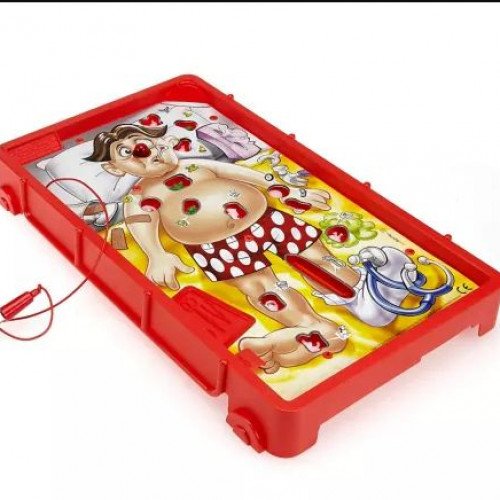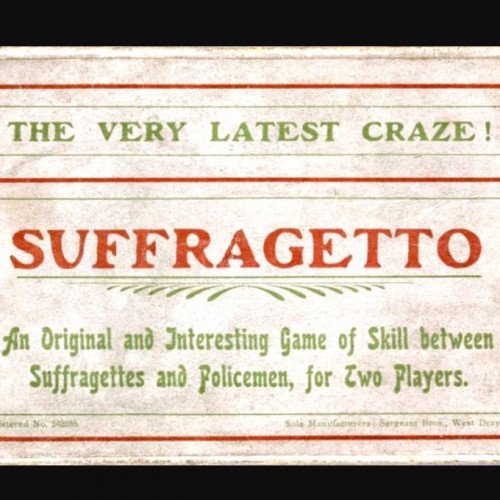OPERATION VS SUFFRAGETTO

OPERATION
Operation is a battery-operated game of physical skill that tests players' hand-eye coordination and fine motor skills. The game's prototype was invented in 1964 by John Spinello, a University of Illinois industrial design student at the time, who sold his rights to the game to renowned toy designer Marvin Glass for a sum of US$500 and the promise of a job upon graduation (a promise that was not upheld). Initially produced by Milton Bradley in 1965, Operation is currently made by Hasbro, with an estimated franchise worth of US$40 million. The game is a variant on the old-fashioned electrified wire loop game popular at funfairs. It consists of an "operating table", lithographed with a comic likeness of a patient (nicknamed "Cavity Sam") with a large red lightbulb for his nose. This could be a reference to classic cartoons, where ill characters' noses turn red. In the surface are a number of openings, which reveal cavities filled with fictional and humorously named ailments made of plastic. The general gameplay requires players to remove these plastic ailments with a pair of tweezers without touching the edge of the cavity opening. Operation includes two sets of cards: The Specialist cards are dealt out evenly amongst the players at the beginning of the game. In the U.S and Australian version, players take turns picking Doctor cards, which offer a cash payment for removing each particular ailment, using a pair of tweezers (dubbed “Electro Probe” in earlier versions) connected with wire to the board. Successfully removing the ailment is rewarded according to the dollar amount shown on the card. However, if the tweezers touch the metal edge of the opening during the attempt (thereby closing a circuit), a buzzer sounds, Sam's nose lights up red, and the player loses the turn. The player holding the Specialist card for that piece then has a try, getting double the fee if he or she succeeds. Since there will be times when the player drawing a certain Doctor card also holds the matching Specialist card, that player can purposely botch the first attempt in order to attempt a second try for double value. The winner is the player who holds the most money after all the ailments are extracted. Subsequent later games removed the money and cards, and the winner of these editions is the player who removes the most ailments.
Statistics for this Xoptio

SUFFRAGETTO
Suffragetto was a board game published in the United Kingdom around 1908 by the Women's Social and Political Union (WSPU) and manufactured by Sargeant Bros. Ltd. In modern terms, it was developed to "enact feminist ideology in a hybrid fantasy-real world environment" to support the activist strategies of the suffragettes. The game is a contest of occupation featuring two players around a grid board representing the streets of Edwardian London. One player plays 21 green markers as the radical suffragettes, the other player plays 21 dark blue markers as the police constables. The objective of the suffragettes is to break through police lines and enter the House of Commons, while at the same time preventing the police from entering Albert Hall. The objective of the police is to disrupt the meeting of the suffragettes by entering Albert Hall, while at the same time preventing them from entering the House of Commons. "Arrested" suffragettes are confined to the "prison" section of the board, whereas "disabled" constables are confined to the "hospital" section. The game is won by the first player who introduces six markers into the opponent's base. The WSPU were enthusiastic about manufacturing and selling the game, as it would allow the organisation to continue running without having to depend on donations from wealthy individuals. Oxford's Bodleian Libraries has the only known surviving copy of the game. Suffragetto was among several children's games designed at that time around the themes of gender, resistance, and social relationships, along with the contemporaneous games Panko and Pank-a-Squith (1909). The goal of the latter was to navigate a suffragette (led by Emmeline Pankhurst) down a long path from her home to parliament, past obstacles placed by the Liberal government (led by Prime Minister H. H. Asquith).